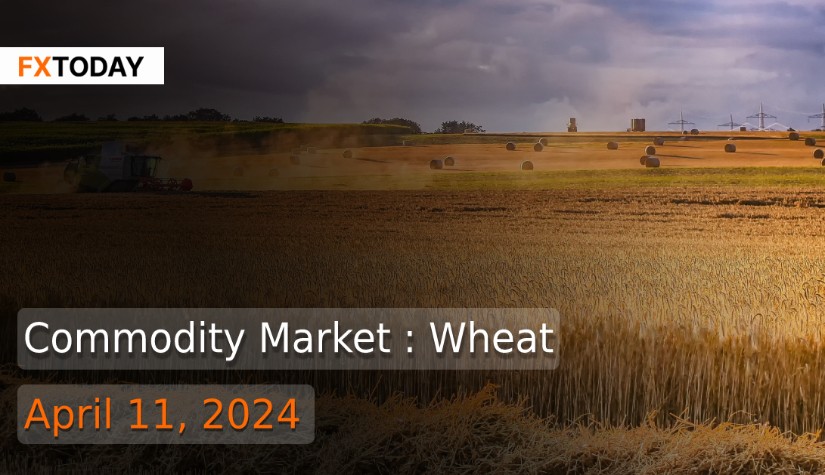Wheat Market Faces Geopolitical Pressures Amidst Price Surge and Quality Concerns
The wheat market has seen a notable uptick recently, largely propelled by a combination of fund-driven investments and technical trading. Amidst ongoing geopolitical tensions, particularly in regions like the Black Sea, both Russia and Ukraine have managed to maintain their competitive edge in export prices, despite the challenges posed by conflicts and infrastructure damage. This resilience in the face of adversity underscores the significance of these nations in global wheat trade.
However, it's not all smooth sailing for wheat exporters. Russian wheat exporters, in particular, are grappling with quality concerns, which could potentially impact their market share in the long run. Meanwhile, in the U.S., the emergence of warm, dry spells in parts of the Plains region has raised concerns, especially for hard red winter wheat (HRW), while some areas cultivating soft red winter wheat (SRW) are facing excessive moisture, posing challenges for crop development.
In the realm of international trade dynamics, China's wheat imports are expected to drop in 2024 due to recent cancellations and delays in shipments, raising concerns about weakening demand. The cancellations, including a record-breaking half a million tons of US wheat, suggest a shift in China's procurement strategy. Such actions are often interpreted as strategic moves aimed at securing better pricing or enhancing food security measures, while China's reluctance to increase imports from Russia is due to quality concerns. The impact of the cancellations has led to a significant decline in global wheat prices, reflecting China's efforts to bolster food security amidst economic challenges and tensions with the United States by diversifying its wheat sources to meet domestic demand.
Meanwhile, in the UK, farming groups have sounded alarm bells due to unprecedented rainfall, resulting in submerged fields and diminished crop yields. This has forced the nation to rely heavily on wheat imports, with potential repercussions on consumer prices for products like bread. Reduced yields and waterlogged soil have become pressing concerns for farmers, highlighting the vulnerability of agricultural sectors to extreme weather events.
On a global scale, research from Purdue underscores the efficiency of wheat farming operations in Germany, which boast significantly higher yields compared to counterparts in the U.S. and Australia. Despite higher input costs, European farms exhibit superior economic profitability, showcasing the importance of factors like technology adoption and agricultural practices in driving productivity gains.
On the other hand, Ukrainian wheat prices are rising due to decreased activity from major players ahead of the new season harvest. Despite a drop in prices last week, the market is rebounding, with prices expected to continue increasing. Exports are anticipated to reach 3 million tons by April's end, driven by rising demand fueled by production declines in key exporting regions. The Ukrainian wheat market is projected to continue its upward trend in response to growing demand.
Wheat prices are up across all three exchanges, led by gains in KC futures, with MPLS spring wheat contracts also showing increases. The weekly Export Sales report expected on Thursday could see net cancellations of old crop wheat sales, with new crop bookings anticipated. Monthly WASDE data updates are also expected, with traders predicting an increase in ending stocks. Additionally, Japan's Ministry of Ag has issued a tender to buy wheat from the US, Canada, and Australia.
Commodity analysis firm Argus has revised its forecast for Russian wheat production upward, citing favorable conditions for winter wheat despite concerns about spring planting. Meanwhile, European wheat futures rose on Wednesday, supported by a drop in the euro against the dollar and renewed concerns about Black Sea supply, while Russian strikes on southern Ukraine led to some short-covering in wheat.
As the wheat market navigates through these multifaceted challenges and opportunities, market participants are closely monitoring key indicators such as USDA reports and weather forecasts to gauge future trends. Consequently, there is a possibility of a slight uptick in wheat prices during this period, although any upward movement is anticipated to be constrained in the medium term.
Data for Technical Analysis (1H) CFD US Wheat Futures - May 24 (ZWK4)
Resistance : 557.17, 557.84, 558.93
Support : 554.99, 554.32, 553.23
1H Outlook
Source: TradingView
Buy/Long 1 If the support at the price range 552.99 - 554.99 is touched, but the support at 554.99 cannot be broken, the TP may be set around 557.41 and the SL around 552.00, or up to the risk appetite.
Buy/Long 2 If the resistance can be broken at the price range of 557.17 - 559.17, TP may be set around 561.00 and SL around 553.99, or up to the risk appetite.
Sell/Short 1 If the resistance at the price range 557.17 - 559.17 is touched, but the resistance 557.17 cannot be broken, the TP may be set around 554.56 and the SL around 560.17, or up to the risk appetite.
Sell/Short 2 If the support can be broken at the price range of 552.99 - 554.99, TP may be set around 551.00 and SL around 558.17, or up to the risk appetite.
Pivot Points Apr 11, 2024 03:21AM GMT
|
Name
|
S3
|
S2
|
S1
|
Pivot Points
|
R1
|
R2
|
R3
|
|---|---|---|---|---|---|---|---|
| Classic | 551.71 | 553.23 | 554.56 | 556.08 | 557.41 | 558.93 | 560.26 |
| Fibonacci | 553.23 | 554.32 | 554.99 | 556.08 | 557.17 | 557.84 | 558.93 |
| Camarilla | 555.12 | 555.38 | 555.64 | 556.08 | 556.16 | 556.42 | 556.68 |
| Woodie's | 551.63 | 553.19 | 554.48 | 556.04 | 557.33 | 558.89 | 560.18 |
| DeMark's | - | - | 553.9 | 555.75 | 556.75 | - | - |
Sources: The Guardian, Open4Business, Deutsche Welle, ChemAnalyst
















